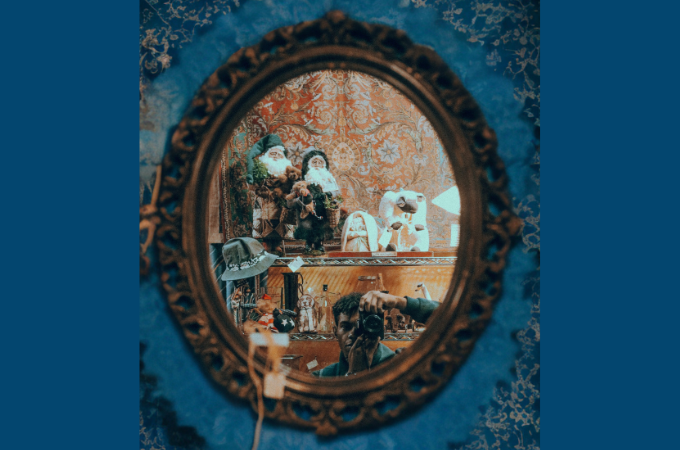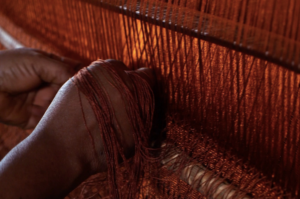
Deolu’s eyes move behind his camera, scanning for another moment to capture. There were only so many pictures you could take of the child with ice cream smeared along his face, and his mother was wiping it off anyway. Brushing the grass off his shorts and picking up his drink with his other hand, he got up to leave.
“You don’t want that bag anymore?” Wuraola asked. I’ll rather you take it now than look all over the city for you in the coming weeks.”
“Why not? Those usually end well in the movies.” Wuraola smiled at that, and Deolu started to lift his camera, then stopped.
“Not picture worthy?”
“That’s not why I stopped.”
“Why did you stop then?” Wuraola tilted her head. The photographer was tapping his feet and looking at her in confusion. She liked how he looked.
“If I took a picture of you and left, I would look at and think of nothing else till I see you again. I would have to look all over the city for you.” Wuraola shouted with laughter. Deolu wished pictures could hold sounds when he heard her laugh. He wanted to hear nothing else for the rest of his life. She stretched her hand towards him, and he pulled her up.
“Ice cream?” He had never meant a yes more in his life.
Wuraola opens her eyes from the recurring dream that had plagued her for weeks. With every passing night, new details appeared. This time, Deolu’s Armani bracelet glistened on his wrist. He never took that bracelet off. He had it on in the shower, pool, and in bed. Tonight, she was being punished by the familiarity of an accessory. It has been years since she first met him in that park. Since love ran through her and threatened to make a new woman of her. Since she sat in an empty apartment that echoed her love back to her because the man she gave it to chose to be elsewhere. But her dreams show her that first afternoon. The afternoon she expected nothing but got everything.
“Nostalgia is the ultimate enemy
What good is there in remembering in pieces?”
Deolu was magic. Not only in the things he said or how he made her feel but he looked like it too. That afternoon in the park, she had spent most of the picnic staring at the man across from where she and her friends had set up camp. He was sitting with his legs folded up against him, head bent in a thorough inspection of a camera. His face switched between approval and excitement. Wuraola wanted to see what he was looking at but more than that, she wanted to see his face again.
He had short hair. A nice fade, with a parting that ran almost to the middle of his head. Wuraola would soon convince him to let it grow. She liked the way he held her ankle when she braided it. She liked how he looked with the big mess of curls spilling over his face. Most of all, she liked when she could smell her shampoo in his hair. Deolu shined in every room he was in. He was beautiful. For all the excesses in him, there was none on him. No pound of flesh or muscle didn’t fall into place on Deolu’s body. He was a man as a man should be.
The cushy arms of a trust fund allowed him to pursue a career that was more passion than profit, and the world was lucky for it. There are moments when everything falls into place. When a ray of sunlight cuts right between the leaves on a tree, giving the women sitting under it a halo. When the child sitting with her father lifts something for his inspection, he smiles at her, love shining in his eyes. These moments happen so often that sometimes we forget to appreciate them. To see the wonder in them because of the distractions in life. But not Deolu. Camera in hand, lens at a ready, he lived to capture moments. He keeps the father smiling at his daughter forever and makes angels out of women reading alone in parks.
She would argue the mundaneness of the world. Sunlight did not create celestial beings. Fathers should adore their little girls. But he gave her new eyes. He showed her that magic existed where we make it, and she chose him as her canvas.
“Nostalgia says to remember the softness of his lips
And the firmness of his hardness
She asks when you will feel it again.
When will your hips arch in welcome of love?”
Wuraola and Deolu first created love in a picture-filled room on Glover street. She had stopped for her brief visit on her way back from the beach that evening. Deolu’s mother fawned over her and demanded that she stay for dinner even though she would not be there. Lagos couldn’t take a night without her, she declared as she dragged her more than willing husband out the door. They ate dinner in the company of silence and heavy glances that even a blind man could not misinterpret. They created their love to music from a gifted vinyl player, with the confidence that it would happen again. Love was born on the softness of Egyptian cotton sheets.
These must be recipes for immortality, for that love has refused to die. Even when all she had left of it were pictures of yesterday
“Nostalgia, who forgets to forget”
A Sunday afternoon in Lagos, a crisp white shirt and a dress too tight for the shenanigans yet to come. Deolu chose the white shirt to make amends. Wuraola could fend off anything but her man in a white shirt. Wuraola chose the tight dress as punishment. The lesson was to see what he was missing if he didn’t always choose locations and the far-away life over her.
Wuraola was quick to set aside discipline for forgiveness. They exchanged laughter, secrets and inappropriateness over wine glasses in restaurants, galleries, and gardens like the one they first met. Lagos was many things, but it gave Wuraola love and flowers on Sundays. And for that, Eko o ni baje.
“She doesn’t mention all the times your body was heavy from carrying hurt.
She leaves out the nights you willed yourself to forgiveness.”
Wuraola gives the flowers now. She keeps to Sundays because she knows how important routine is for Deolu’s messy life. She knows he declares rest from work, friends, and all life that wasn’t her on Sundays. Sundays were his dedicated days to her, and now they were hers to him.
She stands there in a dress he would have liked, holding flowers like the ones he gave her. Wuraola stands in front of the picture Deolu’s mother insisted on including in his tomb. It was a picture of three shoes: a functional black sandal, a beautiful pair of Kurt Geiger mules, and a limited edition Nike Air Jordan. It was the picture of a family she could have been a part of. It was a picture of completion, of a life lived.
The functional sandals should have a son to live on in his name. The mules deserve grandchildren to shower in love and inherit that dimple. The Jordans should have scoffed, asking her to be his forever.
She should not come here so often. She should move on with her life. But she lived a life and loved a man. Nostalgia insists that she remembers not to forget. So she plagues her with pictures.
Pictures of first meets.
Pictures of bodies tangled.
Pictures of Deolu lying breathless on the ground,
a tire mark across his face.
Photo by Peter Kalonji on Unsplash










Nneoma Okorie June 20, 2023 17:11
Beautiful